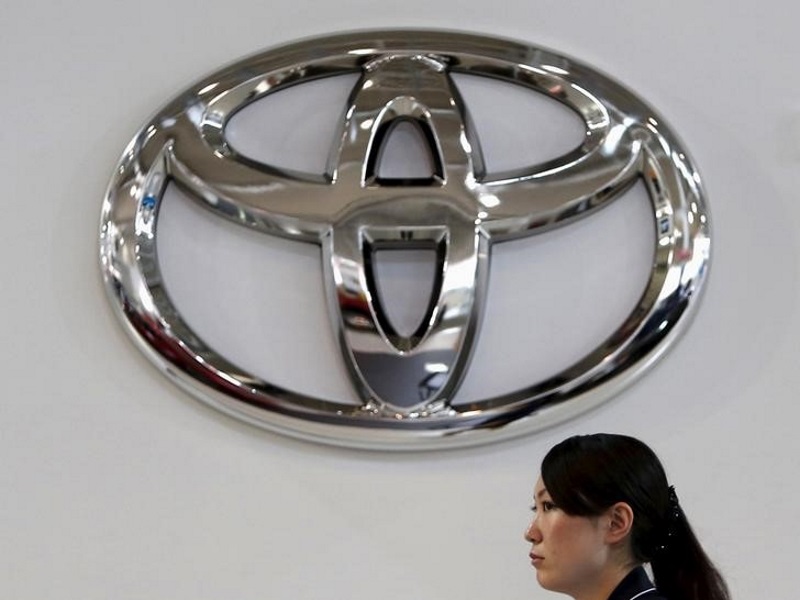- Home
- Others
- Others News
- Toyota to Adopt Ford's SmartDeviceLink to Counter Apple, Google in Dashboard War
Toyota to Adopt Ford's SmartDeviceLink to Counter Apple, Google in Dashboard War

Toyota, the world's largest automaker by vehicle sales, and Ford, the No. 2 US automaker, said they will adopt a Ford-developed software called SmartDeviceLink, or SDL, as the standard for connecting smartphone apps to vehicle dashboard screens.
(Also see: Ford's Sync 3 Platform to Get Android Auto and Apple CarPlay Support)
SDL technology integrates smartphones apps with vehicles through dashboard buttons, display screens and voice recognition technology. Using it as a standard for projecting navigation or music streaming apps from a driver's smartphone could help Ford and Toyota reduce dependence on Apple or Alphabet Inc's Google, company officials said.
It could also keep tighter control of customer data and the brand-defining look and feel of dashboard infotainment systems, they added.
Adopting a connectivity standard not linked to Apple or Google may help automakers in China, the world's largest auto market, where homegrown companies such as Alibaba Group Holding Ltd are major players in mobile mapping and services. Google has a limited presence in China, although the company has signaled it could expand there.
Ford said France's Peugeot SA and Japanese automakers Honda Motor Co , Subaru and Mazda Motor Corp are also investigating adopting SDL as a standard. QNX Software Systems and UIEvolution, developers of automotive connectivity technology, are also adopting SDL, Ford said.
QNX, a unit of Canada's Blackberry Ltd, designs infotainment system software used by 40 automakers.
The Ford-Toyota tie-in follows the purchase late last year by a consortium of German automakers of HERE, a mobile mapping business formerly owned by Finland's Nokia. Daimler AG, BMW AG and Volkswagen AG's Audi brand say they will use HERE as a foundation for new connectivity services and features.
Mapping is critical to autonomous driving systems, which the German luxury car makers intend to roll out over the next few years.
Apple and Google bring formidable weapons to the rapidly evolving battle for control of connected cars.
The Silicon Valley giants have armies of programmers, bulging cash reserves and deep experience in managing and profiting from consumer data.
Even as they maneuver to avoid becoming beholden to them, many automakers are adopting Apple's CarPlay and Google's Android Auto systems to respond to customer demands for better connections between cars and smartphones.
© Thomson Reuters 2016
For the latest tech news and reviews, follow Gadgets 360 on X, Facebook, WhatsApp, Threads and Google News. For the latest videos on gadgets and tech, subscribe to our YouTube channel. If you want to know everything about top influencers, follow our in-house Who'sThat360 on Instagram and YouTube.
Related Stories
- Samsung Galaxy Unpacked 2025
- ChatGPT
- Redmi Note 14 Pro+
- iPhone 16
- Apple Vision Pro
- Oneplus 12
- OnePlus Nord CE 3 Lite 5G
- iPhone 13
- Xiaomi 14 Pro
- Oppo Find N3
- Tecno Spark Go (2023)
- Realme V30
- Best Phones Under 25000
- Samsung Galaxy S24 Series
- Cryptocurrency
- iQoo 12
- Samsung Galaxy S24 Ultra
- Giottus
- Samsung Galaxy Z Flip 5
- Apple 'Scary Fast'
- Housefull 5
- GoPro Hero 12 Black Review
- Invincible Season 2
- JioGlass
- HD Ready TV
- Laptop Under 50000
- Smartwatch Under 10000
- Latest Mobile Phones
- Compare Phones
- Vivo V50 Lite 5G
- Vivo Y19e
- Oppo F29 Pro 5G
- Oppo F29 5G
- Google Pixel 9a
- Realme P3 Ultra 5G
- Realme P3 5G
- Oppo A5 Pro 4G
- Acer TravelLite (2025)
- Asus Zenbook 14 (2025)
- Honor Pad X9a
- Lenovo Idea Tab Pro
- Itel Unicorn Max
- boAt Ultima Prime
- Haier M95E
- Sony 65 Inches Ultra HD (4K) LED Smart TV (KD-65X74L)
- Sony PlayStation 5 Pro
- Sony PlayStation 5 Slim Digital Edition
- Blue Star 1.5 Ton 3 Star Inverter Split AC (IC318DNUHC)
- Blue Star 1.5 Ton 3 Star Inverter Split AC (IA318VKU)


















